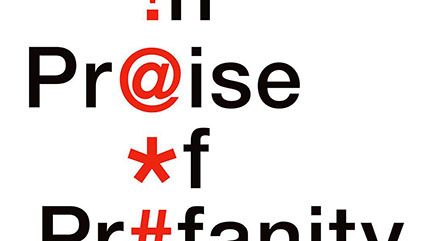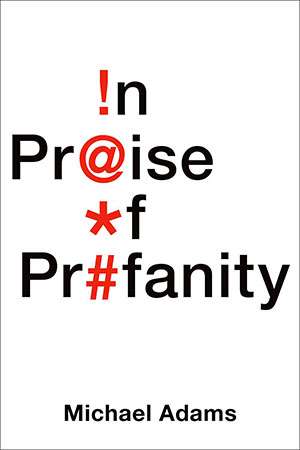Dirty Words
If you can't say something nice, go right ahead.

In Praise of Profanity, by Michael Adams, Oxford University Press, 272 pages, $17.95

I came of age in the era of gangsta rap. As a kid, I was baffled by the "clean" versions of songs—the radio edits of Eazy-E's "Eazy Duz It" and Dr. Dre's "Nothin' But a G Thang"—which were basically just the "dirty" versions with the expletives bleeped out. I certainly knew exactly what words were being removed. Why, I wondered, was the bleeping sufficient to make the song radio-friendly?
My parents raised me not to use "bad" language, but late in elementary school my friends and I learned both how to curse and how to turn off our cursing when grown-ups were around. Just as I wasn't supposed to curse around adults, I was, in some sense, expected to curse around my friends.
Such experiences are explained in Michael Adams' In Praise of Profanity. The book's argument is not that we should use more profanity. It's that profanity evolved within the spontaneous order we call language to perform certain functions. Eliminate profanity and you'll eliminate those functions, making language less powerful.
To talk about the ins and outs and shoulds and shouldn'ts of profanity, we need to distinguish it from slang, obscenity, or just plain coarse language. Adams, a linguistic historian at Indiana University Bloomington, rejects the idea that profanity is inherent in certain words. The profanity of any particular word depends on contextual factors, including the norms of the group where the word is uttered. "Fuck" can be profane ("Go fuck yourself!"), or it can simply be slang ("What the fucking fuck?"). "I'm sick of this shit!" might not be profane among one group of friends; "I'm about to drop a deuce!" would qualify among another, even though the sentence contains no profane words. As with any evolved social system, language's rules are context-dependent, and the rules about what differentiates profanity from slang or just bad manners is context-driven.
Within those contexts, profanity can perform vital functions. Anti-profanity crusaders (look up the No Cussing Club) argue that cursing makes you less articulate and that there are always words we could use in place of profane ones. Wanna bet? Profanity is expressive speech, and as such, synonyms are often imperfect substitutes. It is hard to imagine, for instance, a non-profane way to express that someone is a motherfucker. ("Dirty rascal" just doesn't do it.) When someone cuts off a lane of traffic, what clean alternative will have the same bite as "asshole"? Sometimes, the point of a sentence is to jar, sting, or offend. As long as language needs words that serve those purposes, profanity will be a necessary component of language.
Profane words are also useful for fostering intimacy and solidarity with others. Adams argues that this is "because they carry risk—so that the use of them demands trust." A little dirty talk can improve someone's sex life, for instance, precisely because it means you trust your partner not to take offense—or to go further than your comfort zone. Profanity is hardly the only way to achieve intimacy, but no "clean" language carries profanity's risk, and that makes it a useful tool to build interpersonal trust.
Adams illustrates profanity's power to foster group solidarity by invoking a satirical "children's" book for adults. A surprise bestseller, Go the Fuck to Sleep depicts a frustrated parent wishing to tell a child to go to sleep, but with forceful profanity. The secret to the book's success is the profanity, which is funny to anyone who has been a parent precisely because it's a kind of risky inside joke: "Yup, I remember being that frustrated at my kid that I wanted to call her a fucking asshole…but resisted." Take away the profanity, and the joke is lost.
Adams also discusses the psychology of why we use euphemisms in lieu of actual cursing—replacing, say, "shit" with "the s word." Adams suggests that sometimes we deploy such replacements out of politeness or respect for situational norms. "No freakin' way" stands less chance of offending people than its uncensored counterpart. But that can't be completely right, because when we hear someone say "the s word," we all hear "shit." Many words begin with s, but we know which one the speaker has in mind.
And so he offers a deeper explanation: A euphemism is a palimpsest, a modification of language that still bears traces of its original form. Calling someone you dislike a "b" rather than a "bitch" is less the avoidance of profanity than a way to smuggle profanity into an environment where it wasn't supposed to go. In that way, Adams argues, euphemisms are a type of profanity themselves.
Profanity is useful not just in our day-to-day interactions but also in art. In the book's closing section, Adams examines how profane language enriches three popular creative works.
The TV series The Sopranos contains a lot of profanity (Adams gives us the stats), yet the lion's share occurs in scenes where violence is being either discussed or enacted. These sequences are laced with emotion, and profanity helps convey that emotion. How Late It Was, How Late—the Booker Prize–winning novel about a down-and-out Glaswegian named Sammy—is similarly laced with offensive words. But while some critics found the book obscene, author James Kelman was just trying to depict the real dialect of the working-class characters. And the music of eclectic singer-songwriter Nellie McKay, as Adams puts it, lets her "sing dirty while sounding nice." A sparing use of profanity deliberately disrupts her initial image as a clean-cut female songstress—a way to alert listeners to the fact that the pretty singer with pretty songs doesn't always want to act pretty.
Those are very different reasons to use profanity. But in each case, the results could not be achieved as effectively in other ways.
Words emerge, live, and die by a complex and ongoing social negotiation. So do the informal rules about when and where we can use them. This is in stark contrast to the formal rules the Federal Communications Commission tries to impose on broadcast media—regulations that often ignore words' context and evolution. There is no context-independent answer to whether a term is a legitimate linguistic expression. Both individually and collectively, we make up the answers as we go.
This article originally appeared in print under the headline "Dirty Words."


Show Comments (105)